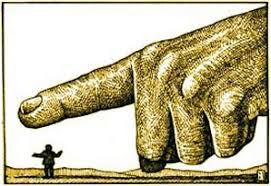Fourth Sunday of Lent
“Surely, we are not also blind, are we?” Jn. 9:40
Today’s gospel is one of the funniest stories in all the Bible … and one of the most profound.
It reminds me of a Keystone Cops skit. You remember – those incompetent policemen from the silent film era who ran around with great vigor and untold enthusiasm, but were so inept that they were never able to solve any of the crimes brought before them.
Take a closer look at what happens in this gospel story:
A man who is born blind is healed by Jesus. Remarkable! Astonishing!
To quote the man born blind: “It is unheard of that anyone ever opened the eyes of a person born blind.”
And yet, there are people not happy about this once-in-a-lifetime-event. The Pharisees, for example, insist that Jesus couldn’t have done this because Jesus healed this man on the Sabbath, and no one can do that on the Sabbath!!
So, now the Pharisees go after the man’s parents.
But the parents don’t want to have anything to do with this controversy, since it may cause them to be vilified, so they toss the hot potato back to their son who has just had his sight restored.
S-o-o-o, once again, the man born blind must tell his story about how Jesus healed him. And, once again, he must endure ridicule from the Pharisees about how this could not have happened because it was done on a Sabbath, and everyone knows that’s not allowed. Therefore, it didn’t happen.
Finally, in utter frustration, the formerly blind man tells the Pharisees off, and in return they tell him off, and they then drive him out of the synagogue – where Jesus comes to find him and reassure him.
What today’s gospel today teaches us is that there is more than one kind of blindness. Actually, the major irony of this story is that the physically sighted people – Jesus’ disciples, the blind man’s parents, the Pharisees, and nameless others – are the truly sightless ones.
And that brings us to you and me – the hearers of this very unusual story.
Where do we fit into this?
“Surely, we are not also blind, are we?”
None of us want to see ourselves as being among the “Pharisees.” They’re the bad guys in this story. And yet, the reality is, like the Pharisees, we appreciate order and certainty and rules and proper decorum.
What we don’t like is unexpected change. What we don’t like is how life is constantly shifting.
So, if we have always held an assumption that something or someone is “wrong,” then we’d rather stick with our assumption than face our fears and prejudiced opinions.
And that’s what is so annoying about Jesus:
He is constantly challenging the barriers we set up. He is constantly tearing down walls and upsetting apple carts and challenging long-held beliefs.
We like those walls and barriers we set up because we believe they will keep us safe and secure and settled.
But if we look to Jesus, we see that this whole idea of barriers itself is where we keep getting it wrong. The life of a faith-filled person is not about being on the “right” side of a barrier instead of the “wrong” side, but about working along with Jesus to break down the barriers all together. Being a person of faith means seeing the bigger picture – the picture of people broken and hurt and hungry and naked and victimized – and committing ourselves to doing whatever we can to help heal them.
And we do this because we, like the man born blind, are beginning to see with the eyes of faith, the eyes of God – beginning to see that all people are, like us, beloved children of God; beginning to see that even the people on the other side of whatever barriers are also beloved children of God!
This is the part of the story that’s obviously not funny.
Yet, I still think that we can all make good use of the ridiculous aspect of the story of the man born blind. Imagine Jesus – with all of God’s love and power and might – breaking down barriers, followed by our tiny frantic efforts to busy ourselves rushing around putting them back up.
Looks like the Keystone Cops to me.
Perhaps if we can see how bumbling and silly we can be, if we can see how much God loves those whom the world does not love, then maybe we can truly see something we couldn’t before – the breadth and depth and magnitude of God’s love for all creation, for all people.
Maybe then our eyes can be opened and we can see, like the blind man, in a way we never could before. Maybe then we can change, not only how we see, but how we do – even to the extent of tearing down our barriers, our prejudices, our Pharisee-like beliefs.
Because, in the end, we all want to have this one single question answered for us:
“Surely, we are not also blind, are we?”
Ted Wolgamot, Psy.D.
11809194.1
3/22/17




